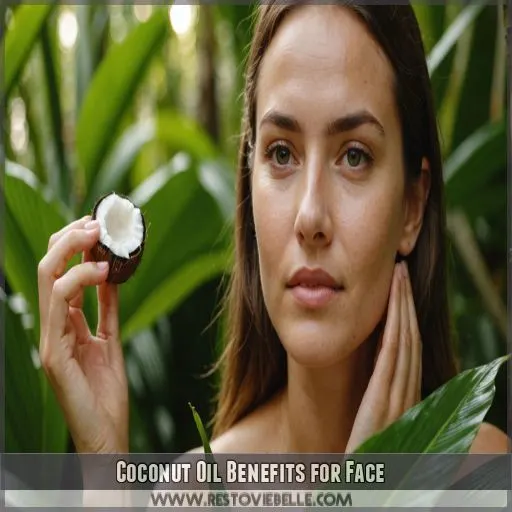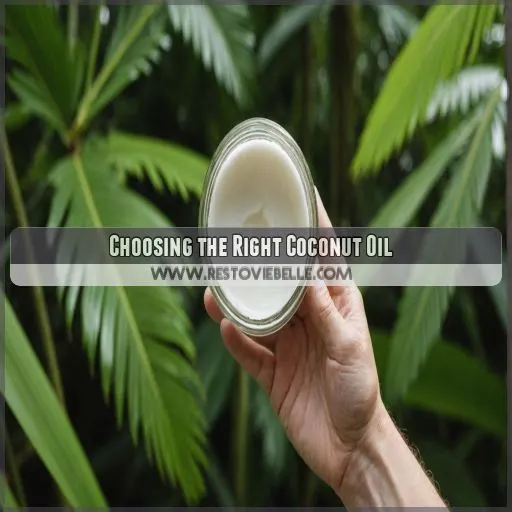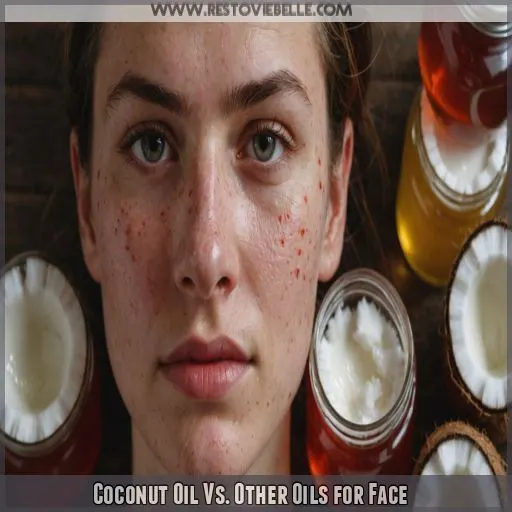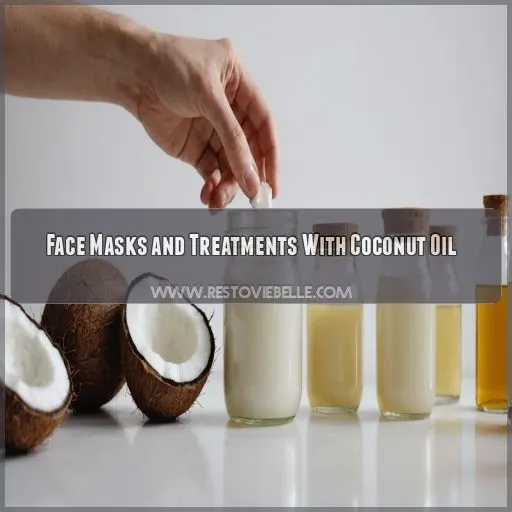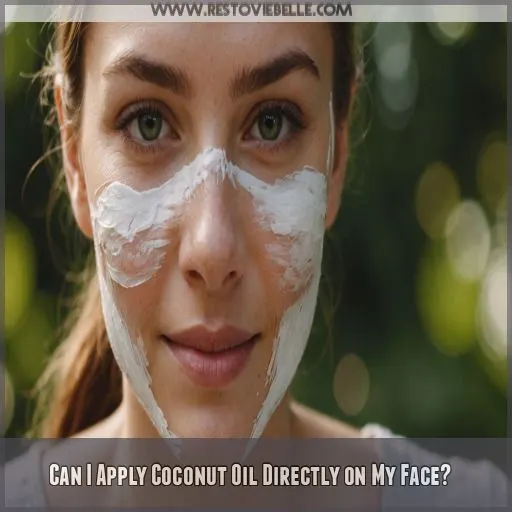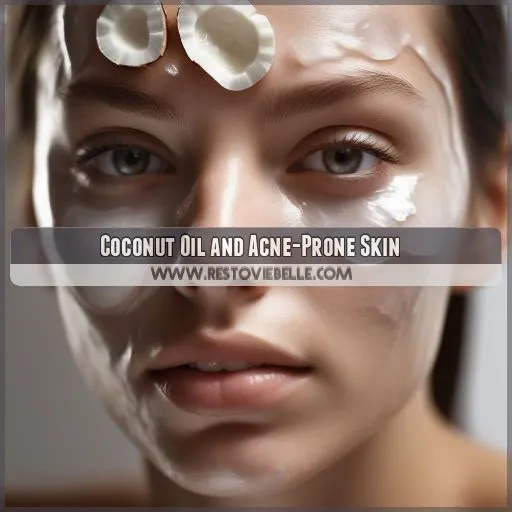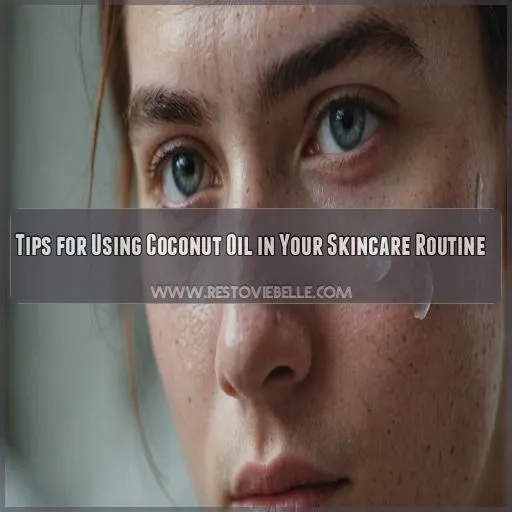This site is supported by our readers. We may earn a commission, at no cost to you, if you purchase through links.
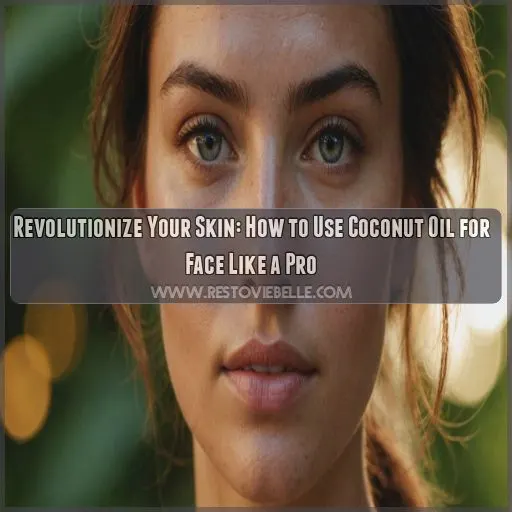 Want to wake up with glowing skin? Learning how to use coconut oil for your face is a great place to start!
Want to wake up with glowing skin? Learning how to use coconut oil for your face is a great place to start!
As a natural moisturizer, makeup remover, and spot treatment for acne, coconut oil can do it all.
First, warm a small amount in your palms and massage it onto your skin to remove makeup.
Then, follow up with a gentle cleanser.
You can also add a few drops to your moisturizer or use it as a hydrating serum.
Just remember to patch test and start slow – your skin will thank you!
Ready to see its full potential?
Table Of Contents
- Key Takeaways
- Coconut Oil Benefits for Face
- Choosing the Right Coconut Oil
- How to Use Coconut Oil for Face
- Top 5 Coconut Oil Products for Face
- Potential Side Effects and Precautions
- Coconut Oil Vs. Other Oils for Face
- Face Masks and Treatments With Coconut Oil
- Can I Apply Coconut Oil Directly on My Face?
- Coconut Oil and Acne-Prone Skin
- Tips for Using Coconut Oil in Your Skincare Routine
- Frequently Asked Questions (FAQs)
- Can I apply coconut oil directly on my face?
- Is it safe to put coconut oil on your face Everyday?
- Do you leave coconut oil on your face or wash it off?
- What are the disadvantages of applying coconut oil on face overnight?
- Can coconut oil help reduce the appearance of facial scars?
- Is coconut oil suitable for use on sensitive facial skin?
- How does coconut oil affect skin elasticity and firmness?
- Can coconut oil be used as a natural sunscreen alternative?
- Does coconut oil help reduce redness and inflammation on face?
- Conclusion
Key Takeaways
- You’re probably wondering if you can apply coconut oil directly to your face, and the answer is that it depends on your skin type. If you have dry or normal skin, coconut oil can be a great moisturizer, but if you have oily or acne-prone skin, you might want to use it with caution or try alternative oils.
- Mastering how to use coconut oil for your face is all about balance – you want to hydrate your skin without clogging pores. Use a lightweight moisturizer, exfoliate regularly, and apply coconut oil in moderation to get the most out of its benefits.
- Coconut oil can be a game-changer for acne-prone skin when used correctly. By balancing hydration and oil production, reducing inflammation, and using coconut oil as a spot treatment, you can harness its benefits while minimizing breakouts.
- Don’t be afraid to get creative with coconut oil and mix it with other natural ingredients to supercharge your skincare. From soothing face masks to hydrating moisturizers, combining coconut oil with other oils and ingredients can help you create your perfect skincare cocktail.
Coconut Oil Benefits for Face
You’re probably no stranger to the wonders of coconut oil, but did you know it can work magic on your face? From its antibacterial and anti-inflammatory properties to its ability to hydrate, moisturize, exfoliate, and even reduce fine lines and wrinkles, coconut oil is a powerhouse of benefits for your skin .
Antibacterial and Anti-Inflammatory Properties
Hey there, friend! Let’s talk about coconut oil’s amazing antibacterial and anti-inflammatory properties. These powers can be a game-changer for acne-prone skin and other skin conditions. Here’s what you need to know:
- Fights bacteria that cause breakouts
- Reduces inflammation and redness
- Soothes sensitive skin
- Natural remedy for skin issues
- Always patch test before using on your face
Hydrates and Moisturizes Skin
You’re fighting dry skin, and coconut oil is your new BFF! Its rich fatty acids lock in moisture, giving you supple, healthy-looking skin. Unlike harsh creams, coconut oil gently hydrates without stripping your skin of its natural oils. For an extra boost, mix it with almond oil to create the ultimate dry skin relief combo.
Exfoliates Dead Skin Cells
Now that you know coconut oil hydrates and moisturizes your skin, let’s talk exfoliation! Coconut oil gently removes dead skin cells, revealing smoother skin. Mix it with sugar or salt for a DIY body scrub, perfect for tackling keratosis pilaris. For sensitive skin, start with gentle exfoliation (1-2 times a week) to reap the benefits without irritation.
Reduces Fine Lines and Wrinkles
You’re fighting fine lines and wrinkles! Coconut oil is your ally. Rich in fatty acids, it helps keep connective tissues strong and supple, reducing the appearance of wrinkles. Use it as a moisturizer or add it to your double-cleanse routine. Mix with argan, jojoba, or rosehip oil for an anti-aging powerhouse that boosts skin elasticity and radiance.
Choosing the Right Coconut Oil
You’re about to discover the secrets of coconut oil for your face, but before you start slathering it on, make sure you’re choosing the right kind. Opt for organic, non-hydrogenated, cold-pressed, or expeller-pressed coconut oil to reap the most benefits for your skin (Source).
Organic and Non-Hydrogenated Options
When choosing coconut oil, go for organic options. The USDA certification guarantees the oil meets strict standards.
This label guarantees you’re getting a high-quality, chemical-free product. Unlike grapeseed or sunflower oil, coconut oil’s non-hydrogenated process preserves its natural goodness.
Select natural brands that adhere to green beauty standards for a product that’s as gentle on your skin as it’s on the planet.
Cold-Pressed and Expeller-Pressed Varieties
Now that you’ve opted for organic and non-hydrogenated coconut oil, let’s talk extraction methods.
Look for cold-pressed or expeller-pressed varieties, as these techniques help maintain higher oil quality.
Cold-pressing uses minimal heat, preserving nutrients, while expeller-pressing uses mechanical pressure, maintaining temperature control.
This careful processing helps keep coconut oil’s natural goodness, making it perfect for skin, hair, and even wound care.
Avoiding Additives and Chemicals
The quest for chemical-free beauty! When choosing coconut oil, steer clear of additives and chemicals that can wreak havoc on your skin. Opt for organic, cold-pressed or expeller-pressed varieties instead. These will make sure you’re getting the good stuff – just pure, unadulterated coconut oil that’ll hydrate and nourish your face without causing water loss or irritation.
How to Use Coconut Oil for Face
You’re about to discover the amazing benefits of using coconut oil on your face, from hydrating and moisturizing to exfoliating and reducing fine lines and wrinkles. Get ready to revolutionize your skincare routine with these simple and effective ways to use coconut oil for a glowing, healthy complexion.
Applying as a Makeup Remover
You’re ready to revolutionize your makeup removal routine with coconut oil. Warm the oil in your palms and massage it onto your skin. Rinse with warm water and pat dry. Easy peasy.
Here are three pro tips for using coconut oil as a makeup remover:
- Double-cleanse: Follow up with a gentle cleanser to remove all residue.
- Be gentle: Massage oil onto skin, don’t scrub or rub.
- Test a small area: Confirm you’re not sensitive to coconut oil before using it on your face.
Using as a Moisturizer
Now that you’ve mastered using coconut oil as a makeup remover, let’s talk moisturizing! Coconut oil can be a game-changer for dry skin. Here’s a breakdown of its moisturizing benefits:
| Skin Type | Moisturizing Benefits |
|---|---|
| Dry | Locks in hydration, soothes dry patches |
| Sensitive | Gentle, non-irritating, and fragrance-free |
| Acne-prone | Reduces inflammation, balances oil production |
| Mature | Plumps fine lines, improves skin elasticity |
| Normal | Maintains healthy hydration levels, prevents dryness |
When using coconut oil as a moisturizer, remember to apply a small amount and blend with other natural ingredients for the best results.
Adding to Skincare Routine for Hydration
Let’s get your skin hydrated and happy. Add coconut oil to your skincare routine by mixing a few drops with your moisturizer or using it as a hydrating serum. For dry skin, blend with shea butter or olive oil. If you’re oily, try a lightweight coconut oil blend with jojoba or argan oil. Experiment and find your perfect hydration boost!
Using as a Spot Treatment for Acne
Now that you’ve added coconut oil to your skincare routine for hydration, let’s talk spot treatment for acne. When a zit pops up, try coconut oil to reduce inflammation and fight bacteria. Here are three tips to keep in mind:
- Apply a small amount: Dab a tiny bit of coconut oil on the affected area to avoid clogging surrounding pores.
- Mix with tea tree oil: Combine coconut oil with tea tree oil for an antibacterial powerhouse that soothes and calms acne-prone skin.
- Use overnight: Apply coconut oil as a spot treatment before bed and wake up to reduced redness and inflammation.
Top 5 Coconut Oil Products for Face
You’re ready to give coconut oil a try on your face, but with so many products out there, it’s hard to know where to start. Let’s break down the top 5 coconut oil products for face that can help you achieve healthy, glowing skin – without the guesswork.
1. OGX Coconut Fine Curls Conditioner
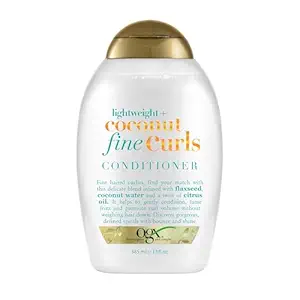
You’re probably thinking, "Wait, isn’t OGX Coconut Fine Curls Conditioner for hair?"
And you’re right! But its blend of coconut water, flaxseed oil, and citrus oil also makes it a great moisturizer for your skin.
It’s lightweight and non-greasy, perfect for hydrating your skin without clogging pores.
Plus, its pleasant scent will leave you feeling like a tropical getaway.
Just remember, a little goes a long way – start with a small amount and adjust as needed.
Best For: This conditioner is ideal for those with fine, curly hair who want to define their curls without weighing them down.
- Lightweight and non-greasy, perfect for hydrating skin without clogging pores.
- Pleasant scent of coconut water, white orange, and tonka bean.
- Gentle enough for sensitive scalps.
- Some users have reported a significant price increase.
- Other OGX products, like the Coconut Milk Conditioner, may offer similar quality at a lower price.
- While gentle, it may not be suitable for all skin types.
2. Coco Creme Curl Quenching Conditioner
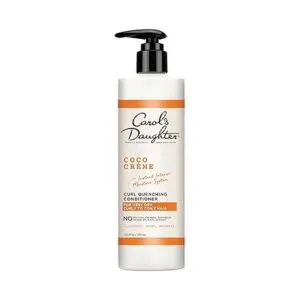
You’re looking for a product that combines coconut oil’s benefits with intense moisturizing power. Enter Carol’s Daughter Coco Creme Curl Quenching Conditioner! This sulfate-free, paraben-free gel helps quench extremely dry hair’s thirst, leaving it hydrated from roots to ends. While it’s designed for hair, its Coco Creme recipe might just tempt you to try it on your skin too. However, be cautious: some users report potential allergies to Murumuru seed, so patch test before using.
Best For: This is a great choice for people with extremely dry hair who want a moisturizing, sulfate-free, and paraben-free conditioner.
- Intensely moisturizing for dry hair.
- Formulated with the Coco Creme recipe for a luxurious experience.
- Leaves hair hydrated from roots to ends.
- Some users report potential allergies to Murumuru seed, so patch testing is recommended.
- May cause sneezing and hoarseness if it gets in eyes or nose.
- May not be suitable for everyone due to potential allergies.
3. Eczema Relief Lotion Fragrance Free
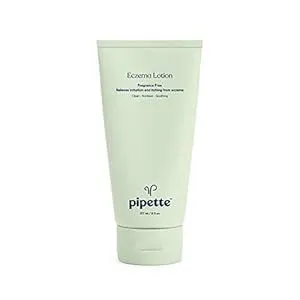
Looking for a coconut oil-infused product that’s gentle on sensitive skin? Try the Eczema Relief Lotion Fragrance Free! This lotion is a game-changer for those with eczema, psoriasis, or dry skin. With colloidal oatmeal, ceramides, and squalane, it soothes irritation, itching, and rough patches. Plus, it’s hypoallergenic, cruelty-free, and EWG Verified. Users rave about its effectiveness in reducing itchiness and redness. Give it a try and say goodbye to dry, itchy skin!
Best For: Those with eczema, psoriasis, or sensitive skin who are looking for a gentle, effective, and fragrance-free lotion.
- Soothes irritation, itching, and rough patches.
- Replenishes skin’s lipid barrier.
- Hypoallergenic, cruelty-free, and EWG Verified.
- May not be as intense as other eczema treatments.
- One user reported receiving an expired product, so always check the expiration date.
- Some users may find the formula too light for their needs.
4. Mother Dirt Lemongrass Deodorant
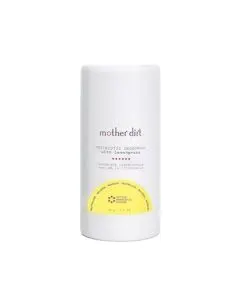
Let’s talk about the Mother Dirt Lemongrass Deodorant, a microbiome-friendly deodorant that’s not just for underarms! While it’s not a traditional face product, its coconut oil and lemongrass ingredients can help regulate bacteria and reduce odor. If you’re prone to breakouts or have sensitive skin, you might want to try a small patch test first. Remember, everyone’s skin is different, so it’s important to pay attention to how your skin reacts and adjust your skincare routine accordingly.
Best For: People looking for a natural deodorant with a light lemongrass scent and microbiome-friendly ingredients.
- Gentle on sensitive skin
- Contains postbiotics to help regulate odor-causing bacteria
- Free of aluminum, synthetic fragrances, and alcohol
- May not be suitable for all skin types
- Contains baking soda, which can be irritating for some people
- Not a traditional face product, so patch testing is recommended
5. Coconut Oil Body Balm with Green Coffee
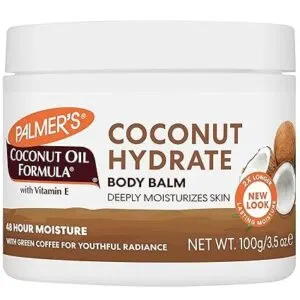
Let’s talk about the Coconut Oil Body Balm with Green Coffee – a game-changer for dry, damaged skin.
This multi-purpose balm nourishes and hydrates from head to toe.
It’s unique solid formula won’t melt in the heat.
With Extra Virgin Coconut Oil and Green Coffee Extract, it’s like a spa treatment in a jar.
Yes, it’s a bit pricey, but trust us, it’s worth it.
Your skin will thank you, and so will the planet – it’s sustainably sourced!
Best For: This balm is best for those with dry, damaged, or cracked skin who want a multi-purpose, hydrating product.
- Unique solid formula that won’t melt in the heat.
- Nourishes and hydrates even the roughest, driest skin.
- Supports sustainable production of Shea and Cocoa Butter and Coconut Oil worldwide.
- May be too pricey for everyday use on the entire body.
- Some users report a gritty texture.
- May linger on skin for hours but does not feel greasy.
Potential Side Effects and Precautions
As you explore the benefits of coconut oil for your face, it’s important to be aware of the potential side effects and precautions to make sure you have a smooth and effective skincare journey. Using coconut oil can come with some drawbacks, such as clogged pores and irritation, especially if you have sensitive skin or are prone to acne (Source).
Comedogenic Properties and Pore Clogging
When using coconut oil on your face, beware of its comedogenic properties, which can clog pores. If you have acne-prone skin, it’s best to avoid it or use the oil cleansing method to minimize risks. Check the comedogenic rating of your coconut oil product and consider your skin type before applying it to your face.
Irritation and Allergic Reactions
When using coconut oil, you might experience irritation or allergic reactions. Don’t panic! Your skin is just being extra cautious. To minimize risks, patch test coconut oil on a discreet area before using it on your face. Some common triggers include:
- Using low-quality coconut oil
- Applying too much oil
- Mixing with other products
- Having sensitive skin
- Ignoring patch testing
Using Alternative Oils for Sensitive Skin
If coconut oil doesn’t agree with your sensitive skin, don’t worry! You’ve got alternatives.
Try calendula or tamanu oil, which are gentler and packed with antioxidants.
Always do a patch test to make sure you’re not sensitive to a new oil.
Blend a small amount with a carrier oil and apply it to a discreet area before using it on your face.
Coconut Oil Vs. Other Oils for Face
As you consider using coconut oil for your face, you’re probably wondering how it stacks up against other popular oils like calendula and tamanu. Let’s compare the benefits and drawbacks of these oils to help you decide which one is best for your skin type and concerns.
Calendula Oil Benefits
Considering an alternative to coconut oil? Enter calendula oil! This gentle giant is perfect for sensitive skin, eczema, and acne-prone faces. With its anti-inflammatory superpowers, calendula oil can even help reduce wrinkles. Here are three benefits you’ll love:
- Soothes and calms irritated skin
- Reduces inflammation and acne
- Hydrates and plumps fine lines and wrinkles
Tamanu Oil Benefits
Now that we’ve explored calendula oil, let’s talk about tamanu oil benefits. This oil is a game-changer for scars, eczema, wrinkles, and acne-prone skin. Here’s a quick rundown:
| Skin Concern | Tamanu Oil Benefits | Coconut Oil Benefits |
|---|---|---|
| Scars | Stimulates collagen production | Hydrates and moisturizes |
| Eczema | Soothes and calms inflammation | Anti-inflammatory properties |
| Wrinkles | Antioxidant-rich, reduces fine lines | Hydrates and plumps skin |
Give tamanu oil a try and see the difference for yourself!
Comparing Antioxidant and Fatty Acid Content
Now that you’ve discovered tamanu oil’s benefits, let’s compare the antioxidant and fatty acid content of coconut oil with other popular face oils. Coconut oil boasts high levels of lauric acid, while olive oil is rich in oleic acid. Jojoba oil, on the other hand, has a balanced fatty acid profile. Which one will you choose for your skin type?
Face Masks and Treatments With Coconut Oil
You’re about to discover the ultimate pampering experience with coconut oil face masks and treatments! From hydrating and nourishing masks to exfoliating and brightening treatments, and even DIY recipes, you’ll discover how to harness the power of coconut oil to give your skin the TLC it deserves.
Hydrating and Nourishing Masks
Hydrating masks with coconut oil can be a game-changer. Mix coconut oil with honey and yogurt for a soothing DIY mask. Apply once or twice a week, leaving it on for 15-20 minutes. Look for ingredients like shea butter, oatmeal, or green tea to enhance coconut oil’s benefits. Your skin will thank you!
Exfoliating and Brightening Treatments
Now that you’ve got hydration covered, let’s talk exfoliation! A coconut oil scrub recipe can be a game-changer for gentle brightening. Mix 1 tablespoon of coconut oil with 1 teaspoon of sugar and lemon juice for a DIY brightening mask. For sensitive skin, start with once a week and adjust as needed. Remember, gentle exfoliation is key!
DIY Recipes and Homemade Masks
Now that we’ve explored exfoliating and brightening treatments, let’s get creative with DIY recipes and homemade masks. Here are three coconut oil face mask recipes to try:
- Hydrating Haven: Mix 2 tbsp coconut oil, 1 tbsp honey, and 1 tsp yogurt for a soothing mask.
- Brightening Boost: Combine 2 tbsp coconut oil, 1 tbsp lemon juice, and 1 tsp turmeric for a radiant glow.
- Detox Delight: Blend 2 tbsp coconut oil, 1 tbsp charcoal powder, and 1 tsp green tea for a purifying treat.
Can I Apply Coconut Oil Directly on My Face?
You’re probably wondering if you can apply coconut oil directly on your face – and the answer is, it depends on your skin type! If you have dry or normal skin, coconut oil can be a great moisturizer, but if you have oily or acne-prone skin, you might want to use it with caution or try alternative oils .
Benefits and Drawbacks of Direct Application
Ready to get up close and personal with coconut oil? Applying it directly to your face can be a game-changer, but it’s not for everyone. If you have large pores or oily skin, you might want to reconsider. Start with a small patch test to gauge your skin’s reaction, and adjust frequency based on your skin type .
Precautions and Contraindications
Now that you know the benefits and drawbacks of direct application, let’s talk precautions and contraindications. If you have coconut oil allergies or sensitive skin, it’s best to patch test or opt for oil-free alternatives. Potential breakouts and comedogenic effects are real, so be cautious. Your skin is unique, so listen to it and adjust your coconut oil usage accordingly.
Coconut Oil and Acne-Prone Skin
If you’re dealing with acne-prone skin, you might be hesitant to try coconut oil, but it can actually be a game-changer when used correctly. By balancing hydration and oil production, reducing inflammation, and using coconut oil as a spot treatment, you can harness its benefits while minimizing breakouts.
Balancing Hydration and Oil Production
When you have oily skin, it’s all about balance. You want to hydrate your skin without clogging pores. Here are some tips to get you started:
- Use a lightweight moisturizer that won’t suffocate your skin.
- Exfoliate regularly to remove dead skin cells and unclog pores.
- Apply coconut oil in moderation, as it can be comedogenic if overused.
Reducing Inflammation and Breakouts
Now that you’re balancing hydration and oil production, let’s tackle inflammation and breakouts.
For acne-prone skin, it’s really important to identify inflammation triggers and avoid them.
Consider oil-free alternatives or calming skin treatments with aloe vera or green tea.
Coconut oil’s lauric acid can help, but use it sparingly to avoid clogging pores.
Natural remedies like tea tree oil can also soothe and calm your skin.
Using Coconut Oil as a Spot Treatment
Now that we’ve tackled reducing inflammation and breakouts, let’s talk about using coconut oil as a spot treatment. For acne-prone skin, apply a small amount of coconut oil directly to the affected area and leave it on overnight. Mix it with tea tree oil or aloe vera for a potent DIY remedy that soothes and heals.
Tips for Using Coconut Oil in Your Skincare Routine
You’re now ready to incorporate coconut oil into your skincare routine – but how much is too much, and how often should you use it? Let’s get into the nitty-gritty of adjusting amounts and frequencies, plus some expert tips on combining coconut oil with other natural ingredients for radiant, healthy-looking skin.
Adjusting Amounts and Frequencies
Time to get personal with coconut oil! Adjusting amounts and frequencies is key to making it work for your skin. Here are some tips to keep in mind:
- Start with a small amount (a few drops) and gradually increase as your skin adjusts.
- Be mindful of your skin type – oily skin may require less frequent application.
- Consider your oil sensitivity – if you’re new to coconut oil, begin with a lower concentration.
- Don’t overdo it – applying too much can lead to clogged pores.
- Pay attention to product concentration – some products may be more potent than others.
Combining With Other Natural Ingredients
Ready to supercharge your skincare? Try combining coconut oil with other natural ingredients! Mix it with honey for a soothing face mask or blend it with jojoba oil for a hydrating moisturizer. Get creative with DIY face masks and natural oil mixtures to create your perfect skincare cocktail. Your skin will thank you for the extra TLC!
Frequently Asked Questions (FAQs)
Can I apply coconut oil directly on my face?
Remember the old adage ‘a little goes a long way’? That’s especially true with coconut oil on your face! Use it sparingly, as it can clog pores. Warm a small amount in your hands and massage it in gently.
Is it safe to put coconut oil on your face Everyday?
You can safely put coconut oil on your face every day if you have non-acne-prone skin, as it’s rich in antioxidants and fatty acids that may help with skin hydration and fine lines .
Do you leave coconut oil on your face or wash it off?
Ah, the coconut oil conundrum! You’re wondering, do I leave it on or wash it off? Well, rinse it off with warm water after massaging it in – it’s a makeup remover, not a moisturizer, sweet freedom for your pores!
What are the disadvantages of applying coconut oil on face overnight?
Applying coconut oil on your face overnight can clog pores and cause breakouts, especially if you have acne-prone skin. You might wake up to unwanted zits, so use it with caution or consider alternative oils.
Can coconut oil help reduce the appearance of facial scars?
The irony – coconut oil, a miracle worker for some, a scar-inducing nightmare for others! But seriously, research suggests that coconut oil’s antioxidants and fatty acids may help reduce facial scar appearance, but results are mixed, so proceed with caution.
Is coconut oil suitable for use on sensitive facial skin?
You’re wondering if coconut oil is suitable for sensitive facial skin? Honestly, it’s a bit of a gamble . While coconut oil has antimicrobial properties , it can also clog pores and cause breakouts .
How does coconut oil affect skin elasticity and firmness?
Imagine your skin as a supple canvas! Coconut oil’s rich antioxidants and fatty acids help maintain skin elasticity and firmness by nourishing connective tissues, giving you a smoother, more radiant complexion over time.
Can coconut oil be used as a natural sunscreen alternative?
You’re looking for a natural sunscreen alternative – can coconut oil do the trick? Not quite, its SPF is too low (around 2-8) to provide reliable protection .
Does coconut oil help reduce redness and inflammation on face?
You’re on a quest for a radiant complexion! Coconut oil’s anti-inflammatory properties can help soothe redness and inflammation on your face, thanks to its lauric acid content . However, use it sparingly, as it can clog pores (Source).
Conclusion
Mastering how to use coconut oil for your face is a journey, not a destination.
Embrace its versatility as a natural moisturizer, makeup remover, and spot treatment.
You’ll be well on your way to radiant, healthy-looking skin.
So, patch test, start slow, and get ready to revolutionize your skincare routine with coconut oil’s incredible benefits.
Your skin will thank you!

